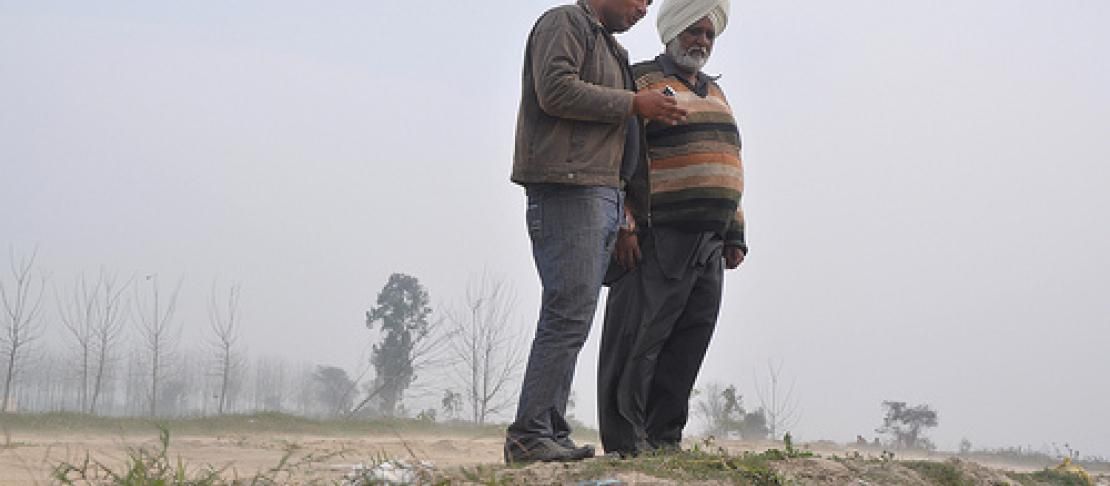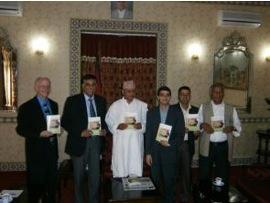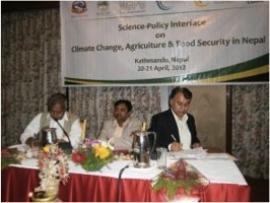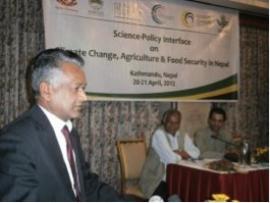Learning platform on climate smart agriculture getting increased attention

By Jaya Gurung and Chandra Adhikari

The CGIAR Research Program on Climate Change, Agriculture and Food Security's (CCAFS) South Asia regional office recently began a Climate Smart Agriculture Learning Platform (CSALP), which aims at improving communication between scientists, policy makers, political leaderships, farmers and other stakeholders on best “climate smart” farming practices. This is vital in a region where one-third of the world’s poorest and malnourished people live. The learning platform publishes quarterly e-newsletter, organizes the Science-Policy-People Interface on Climate Change, Agriculture and Food Security, and initiates discussions, with media, political leadership and other stakeholders on the issues of climate change, agriculture and food security. This platform was inaugurated by the Rt. Honorable President of Nepal, Dr. Rambaran Yadav on 20April 2012 and subsequently released the first issue of the newsletter. Honorable President Dr. Yadav appreciated the efforts of interface among researcher, policy makers and farmers. President Dr. Yadav drew the attention of scientific communities for the fast deteriorating condition of the Chure Bhabar range, the buffer zone of the Mountain Hill and Terai Plain. Dr. Yadav also wished the workshop be productive.
As the second product of this platform, the Science-Policy-People Interface on Climate Change, Agriculture and Food Security in Nepal was organized in partnership with Himalayan Alliance for Climate Change (HIMCCA), The Communicator, Next Generation Parliamentarian Group (NGPG), Ministry of Environment of Government of Nepal on April 20-21, 2012 in Kathmandu, Nepal. In order to provide recent issues on climate change in South Asia and make Members of Parliament (MPs) aware with related policies in Nepal, a one day pre-consultation workshop was organized in Kathmandu on 16 April 2012 in which 20 MPs took their active participation and discussed climate change issues Nepal has been facing with and their efforts to make farming systems resilient to climatic variability.


The general objective of the program was to share the understandings of climate change and the strategies to address among the policy makers, research scientists, academia and famers. Inaugurating the Science-Policy Interface and speaking at the event on 20 April, Minister of Environment, Hem Raj Tated stressed on the need for disseminating information to general public on climate change effects on human life and the ecosystem. He said deforestation must be controlled as climate change could bring about unfavorable changes in weather conditions and decrease land’s fertility. Stating that the government has taken the issues of climate change seriously and started a number of initiatives, the Minister also said that this issue can’t be addressed without mutual cooperation among the concerned stakeholders including international research community.
Inaugurating the second day event and speaking at the event, the Minister of Agriculture and Cooperatives, Akwal Ahammad Sah, stressed on bringing effective programs to minimize the climate change effects in the country stating that the climate change has invited negative impacts in agriculture and the whole ecosystem in Nepal. He further mentioned that the agricultural productivity has been decreasing as the country failed to bring scientific technology and implement it to modernize the agricultural sector. He also stressed that the younger generation should be encouraged towards agriculture sector and there is the immediate need to develop agricultural technology to make farming systems more resilient to climatic variability.
The program was fruitful to meet the designated objectives. A total of 80 participants including 30 Members of Parliament attended the event. Participants from each category received some useful comments and suggestions from the sharing and discussion for further endeavors.
Read more about the workshop held in Kathmandu on 16 April here.
Read more about the climate smart agriculture in South Asia.
This blog post was written by Jaya Gurung, Himalayan Climate Change Initiatives (HIMCCA) and Chandra Adhikari, The Communicator. To get more updates on our research in South Asia follow us on Facebook and Twitter @Cgiarclimate.

